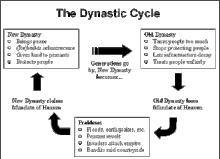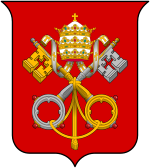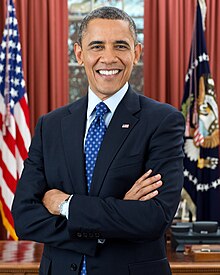The Mandate of Heaven (Chinese: 天命; pinyin: Tiānmìng; Wade–Giles: T'ien-ming, literally "Heaven's will") is a Chinese political and religious teaching used since ancient times to justify the rule of the King or Emperor of China. According to this belief, Heaven (天, Tian) — which embodies the natural order and will of the universe — bestows the mandate on a just ruler of China, the "Son of Heaven" of the "Celestial Empire". If a ruler was overthrown, this was interpreted as an indication that the ruler was unworthy, and had lost the mandate. It was also a common belief that natural disasters such as famine and flood were divine retributions bearing signs of Heaven's displeasure with the ruler, so there would often be revolts following major disasters as the people saw these calamities as signs that the Mandate of Heaven had been withdrawn.
A brief flow chart depicting the flow of auctoritas in the transfer of the Mandate of Heaven at the transition of dynastic cycles.
The Mandate of Heaven does not require a legitimate ruler to be of
noble birth, depending instead on the just and able performance of the
rulers and their heirs. Dynasties such as the Han and Ming dynasties
were founded by men of common origins, but they were seen as having
succeeded because they had gained the Mandate of Heaven. The concept is
in some ways similar to the European concept of the divine right of kings;
however, unlike the European concept, it does not confer an
unconditional right to rule. Intrinsic to the concept of the Mandate of
Heaven was the right of rebellion
against an unjust ruler. The Mandate of Heaven was often invoked by
philosophers and scholars in China as a way to curtail the abuse of
power by the ruler, in a system that had few other checks. Chinese
historians interpreted a successful revolt as evidence that Heaven had
withdrawn its mandate from the ruler. Throughout Chinese history, times of poverty and natural disasters were often taken as signs that heaven considered the incumbent ruler unjust and thus in need of replacement.
The concept of the Mandate of Heaven was first used to support the rule of the kings of the Zhou dynasty (1046–256 BCE), and legitimize their overthrow of the earlier Shang dynasty
(1600–1069 BCE). It was used throughout the history of China to
legitimize the successful overthrow and installation of new emperors,
including by non-Han Chinese monarchs such as the Qing (1636–1912).
History
Transition between the Shang and the Zhou
The prosperous Shang dynasty saw its rule filled with many
outstanding accomplishments. Notably, the dynasty lasted for a
considerable time during which 31 kings ruled over an extended period of
17 generations. During this period, the dynasty enjoyed a period of
peace and tranquility in which citizens could make a good living. The
government was originally able to control most of its internal affairs
due to the firm support provided by the people. As time went on,
however, the rulers' abuse of the other social classes led to social
unrest and instability. The corruption in this dynasty created the
conditions necessary for a new ruling house to rise —the Zhou dynasty.
Rebellion against the Shang was led by Zhou Wu.
They created the Mandate of Heaven to explain their right to assume
rule and presumed that the only way to hold the mandate was to rule well
in the eyes of Heaven. They believed that the Shang ruling house had
become morally corrupt, and that the Shang leaders' loss of virtue
entitled their own house to take over. The overthrow of the Shang
Dynasty, they said, was in accordance with the mandate given by Heaven.
After the Zhou
became the ruling dynasty, they mostly appointed their own officials.
The Zhou Dynasty had their own way of assigning their officials.
However, in order to appease some of the citizens, they allowed some Shang
beneficiaries to continue governing their small kingdoms in compliance
with Zhou rules and regulations. As the empire continued to expand,
intermarriage increased because the rulers believed that it was a method
of forming strong alliances that enabled them to absorb more countries
into the dynasty. In case of a war, the Zhou dynasty boasted an
excellent military and technology mostly because of influence from
annexed countries. They also excelled in shipbuilding, which, coupled
with their discovery of celestial navigation,
made them excellent mariners. Intellectually, the Zhou excelled in
fields of literature and philosophy while many governmental positions
were filled according to the intellectual ability of a candidate. A
large amount of literature survives from the Zhou period, including the Book of Changes, Book of History, Book of Etiquette, Book of Song, Book of Odes, and the Book of Rites. Most of these works are commentaries on the progress and political movement of the dynasty. In philosophical terms, Confucius and his followers played an important role in shaping the mentality of the government as defined by the Five Confucian Relationships.
These critical thinkers served as a foundation for the government.
Their works primarily stressed the importance of the ruling class,
respect and their relationship with the lower class. Due to the growing
size of the dynasty, it became apparent that a centralized government
would lead to a lot of confusion and corruption because the government
would not be able to exert its influence or accede to the needs of
everyone. To address this political barrier, the dynasty formed a
decentralized government in which the empire was broken down into
sections. Within these districts were administrators who were appointed
by the government, in return, they had to maintain their allegiance to
the main internal government. In effect, the Zhou dynasty became a
collection of districts. Consequently, this marked the fall of the
dynasty as it became difficult for the central government to exert
influence on all other regions of the empire.
Finally, when the Zhou dynasty's power decreased, it was wiped out by the State of Qin, which believed that the Zhou had become weak and their rule unjust.
This transition emphasizes the customary trend of the Mandate of
Heaven, which provided leeway for the rise of a new power. The Qin
initially attempted to capitalize on the errors made by the Zhou, either
by eliminating the source of error or reforming it. During this
reformation, administrative changes were made and a system of legalism
was developed which stated that the law is supreme over every
individual, including the rulers. Although significant progress was made
during the Qin dynasty, the persecution of scholars and ordinary
citizens led to an unstable state.
After the death of Qin Shihuang, first emperor of the Qin dynasty,
a widespread revolt by prisoners, peasants, and unhappy soldiers
inevitably led to the fall of the Qin dynasty due to its tyrannical
practices. The establishment of the Han dynasty
marked a great period in China’s history marked by significant changes
in the political structure of the country. Under the Han emperors,
significant changes were made in which the government introduced
entrance examinations known as civil service or imperial examinations for governmental positions. Additionally, the Han dynasty prospered economically through the Silk Road and other trading means.
Five Dynasties period
During the Five Dynasties and Ten Kingdoms Period, there was no
dominant Chinese dynasty that ruled all of China. This created a problem
for the Song dynasty
that followed, as they wanted to legitimize their rule by claiming that
the Mandate of Heaven had passed on them. The scholar-official Xue Juzheng compiled the Old History of the Five Dynasties (五代史) during the 960s and 970s, after the Song dynasty had taken northern China from the last of the Five Dynasties, the Later Zhou.
A major purpose was to establish justification for the transference of
the Mandate of Heaven through these five dynasties, and thus to the Song
dynasty. He argued that these dynasties met certain vital criteria to
be considered as having attained the Mandate of Heaven despite never
having ruled all of China. One is that they all ruled the traditional
Chinese heartland. They also held considerably more territory than any
of the other Chinese states that had existed conterminously in the
south. When the Mandate of Heaven gave Zhou the ruling authority they
had to figure out how to govern.
However, there were certain other areas where these dynasties all clearly fell short. The brutal behavior of Zhu Wen and the Later Liang
was a source of considerable embarrassment, and thus there was pressure
to exclude them from the Mandate. The following three dynasties, the Later Tang, Later Jin, and Later Han were all non-Han Chinese dynasties, all having been ruled by the Shatuo
ethnic minority. There is also the concern that though each of them was
the most powerful Chinese kingdom of its respective era, none of them
ever really had the ability to unify the entire Chinese realm as there
were several powerful states to the south. However, it was the
conclusion of Xue Juzheng
that the Mandate had indeed passed through each of the Five Dynasties,
and thus onto the Song Dynasty when it conquered the last of those
dynasties.
Qing invasion
In previous dynasties; the Song, Jin, and Yuan dynasties reigned for
much of the beginning three centuries where the mandate of heaven was
questioned heavily between dynastic councils among each emperor. Some
emperors were not entirely sure of their validity when it came to
claiming the mandate, for it was ambiguous. Especially for the case of
the Jurchen Jin, where much of the council was not sure how to discern the validity of their rulers. From the Emperor Gaozong of the Tang Dynasty to Kangxi Emperor
much of the chosen emperors contemplated much of this when they became a
contender for the mandate. The reason for this was because of the
ambiguity of the Mandate and overwhelmingly unofficial formality when
declaring the Mandate of Heaven. However, Kublai Khan was the only indifferent ruler when he claimed the Mandate of Heaven over the Yuan Dynasty since he had a sizable military and was part of the Khitan people,
as with many others from the same background since they did not have
the same traditions and culture as their Chinese adversaries.
It was said that the peasant group of the Ming dynasty were the
real selectors which allowed for the Mandate of Heaven to be claimed by
the ruler. As a prospective candidate to the Mandate, they could please
the peasantry group in order to win favor amongst the dynasty. It was
solely politics from beginning to end and an attempt from the emperor to
maintain a favorable act towards Heaven. Many emperors within the Qing
dynasty looked immensely within themselves trying to come to terms with
their ruling if natural disasters occurred within their time. This was
interpreted as a warning of Heaven's displeased wrath towards an
emperors ruling, such that the Mandate under their rule was unstable.
Furthermore, Qing emperors would take their advisors feedback very
seriously when pertaining to ruling and take it upon themselves to
reflect on their current decisions of the dynastic overview in hopes
that it favors Heaven.
The right to rule and the right of rebellion
Mencius stated that:
The people are of supreme importance; the altars of the gods of earth and grain come next; last comes the ruler. That is why he who gains the confidence of the multitudinous people will be Emperor... When a feudal lord endangers the altars of the gods of earth and grain, he should be replaced. When the sacrificial animals are sleek, the offerings are clean and the sacrifices are observed at due times, and yet floods and droughts come [by the agency of heaven], then the altars should be replaced.
— Mencius
Chinese historians interpreted a successful revolt as evidence that
the Mandate of Heaven had passed. In China, the right of rebellion
against an unjust ruler has been a part of political philosophy ever
since the Zhou dynasty, and the successful rebellion was interpreted by
Chinese historians as evidence that divine approval had passed on to the
successive dynasty. The Right of Rebellion is not coded into any
official law. Rather, rebellion is always outlawed and severely
punished; but is still a positive right grounded in the Chinese moral
system. Often, it is used as a justification for actions to overthrow a
previous dynasty after a rebellion has been successful and a new
dynastic rule has been established. Since the winner is the one who
determines who has obtained the Mandate of Heaven and who has lost it,
some Chinese scholars consider it to be a sort of Victor's justice, best characterized in the popular Chinese saying "The winner becomes king, the loser becomes outlaw" (Chinese: “成者爲王,敗者爲寇”).
Due to this, it is considered that Chinese historical accounts of the
fall of a dynasty and the rise of a new one must be handled with
caution. Chinese traditional historical compilation methods produce
accounts that tend to fit their account to the theory, emphasizing
aspects tending to prove that the old dynasty lost the Mandate of Heaven
and the new one gained it, and de-emphasizing other aspects.
In the 20th and 21st centuries, Confucianist elements of student
rebellions often claimed the Mandate of Heaven has been forfeited, as
demonstrated by their large-scale activism. Important instances include
the Taiwan's Sunflower Student Movement in 2014 and Hong Kong's Umbrella Movement in 2019.
Influence
Because
of China's influence in medieval times, the concept of the Mandate of
Heaven spread to other East Asian countries as a justification for rule
by divine political legitimacy. In Korea, it was first adopted by the Joseon dynasty and became an enduring state ideology.
The ideology was also adopted in Vietnam, first recorded as the oldest Nanyue kingdom when Zhao Tuo claimed himself Emperor Wu of Zhao, known in Vietnamese as Thiên mệnh (Chữ Hán:
天命). A divine mandate gave the Vietnamese emperor the right to rule,
based not on his lineage but on his competence to govern.
The more later centralized dynasties adopted Confucianism as state
ideology, led to the creation of a Vietnamese tributary system in
Southeast Asia, modeled after the Chinese Sinocentric system in East Asia.
In Japan, the Japanese government found the concept ideologically
problematic, preferring not to have divine political legitimacy that
was conditional and that could be withdrawn. The Japanese Taihō Code, formulated in 703, was largely an adaptation of the governmental system of China's then Tang dynasty, but the Mandate of Heaven was specifically omitted. In later times, this need was obviated because the Imperial House of Japan claimed to be descended in an unbroken line from the Japanese sun goddess, Amaterasu. Nevertheless, while maintaining this role, the Japanese emperor became politically marginalized in the Nara and Heian periods by powerful regents of the Fujiwara clan
who seized executive control of state. Even though the Japanese
imperial line itself remained unbroken after the eighth century, actual
political authority passed through successive dynasties of regents and shōguns which cycled in a manner similar to that of Chinese dynasties. Even after the Meiji Restoration
in 1868, when the emperor was placed back in the center of the
political bureaucracy, the throne itself had very little power vis-à-vis
the Meiji oligarchy. Actual political power has passed through at least four systems since the Meiji restoration: the Taishō democracy, the militarists, the Occupation of Japan, and postwar democracy.
The emperor today is a political figurehead and not a ruling sovereign.
It could be said the imperial line of Japan survived for so long
precisely because it did not have control over the state, and that the
turmoil of succession was projected onto a series of proxy rulers.













